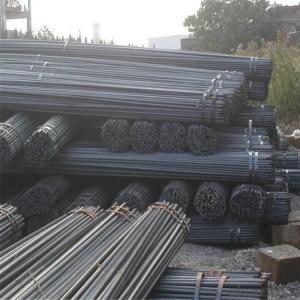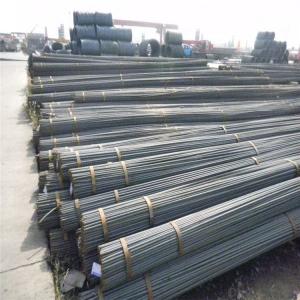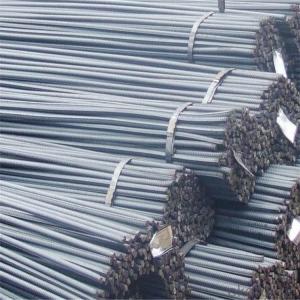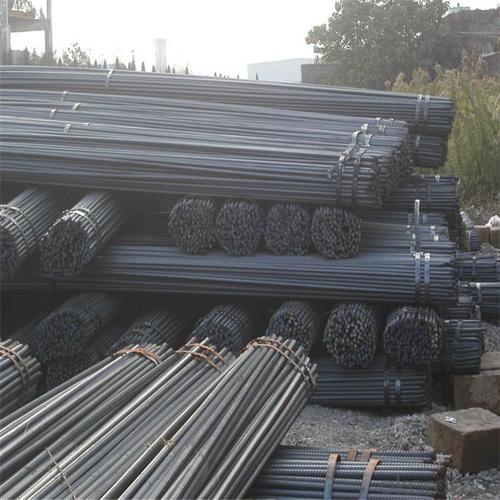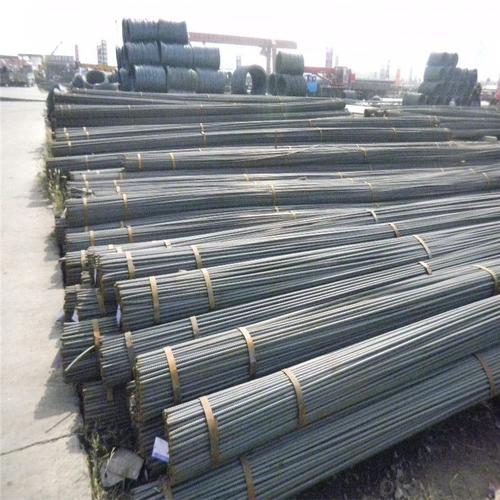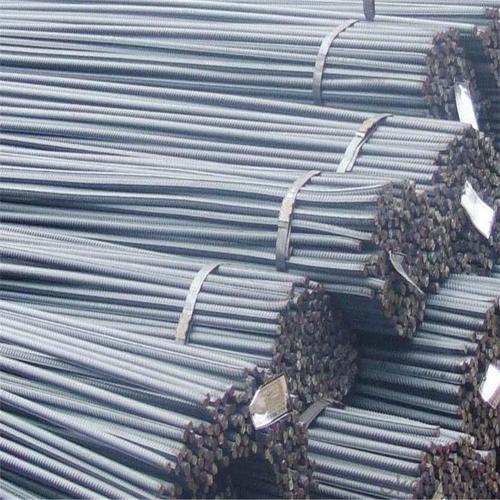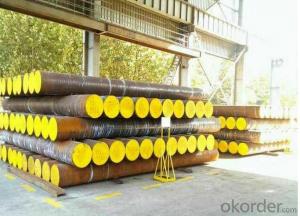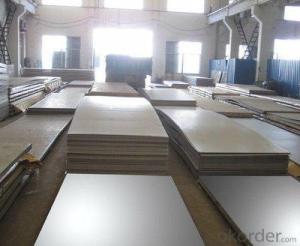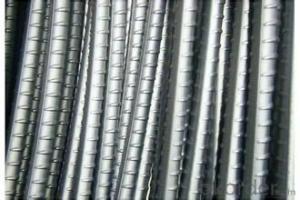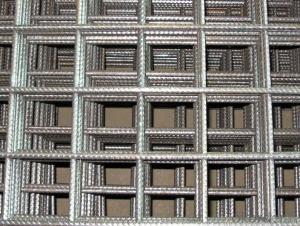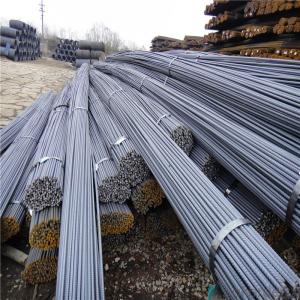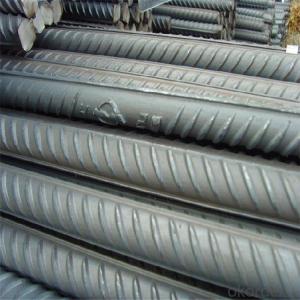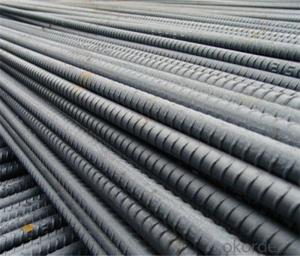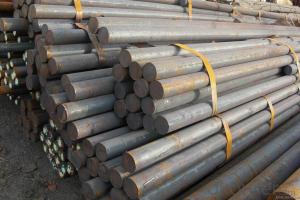Earthquake Resistant Corrugated Deformed Steel Bar
- Loading Port:
- Tianjin
- Payment Terms:
- TT OR LC
- Min Order Qty:
- 190 m.t.
- Supply Capability:
- 50000 m.t./month
OKorder Service Pledge
OKorder Financial Service
You Might Also Like
Specification
Earthquake Resistant Corrugated Deformed Steel Bar
Description of Earthquake Resistant Corrugated Deformed Steel Bar
1, Diameter: 5.5mm-10mm Earthquake Resistant Corrugated Deformed Steel Bar
10m- 40mm Earthquake Resistant Corrugated Deformed Steel Bar
2, Length: 6m, 9m, 12m or customized
3, Standard: GB, ASTM, AISI, SAE, DIN, JIS, EN
OEM technology - send detailed technical parameters for accurate quotation.
2, Produce Process: smelt iron - EAF smelt billet - ESR smelt billet -
hot rolled or forged to get the steel round bar and plate
3, Heat Treatment: annealing, normalizing, tempering, quenching
4, Surface Treatment: Black
5, Quality Assurance: We accept third party inspection for all orders.
You can ask testing organizations such as SGS, BV, etc. to test our products before shipping.
Chemical Composition of Earthquake Resistant Corrugated Deformed Steel Bar
Grade | Technical data of the original chemical composition(%) | |||||
Reinforcing steel bar HRB335 | C | Mn | Si | S | P | B |
≤0.25 | ≤1.60 | ≤0.80 | ≤0.045 | ≤0.045 | >0.0008 | |
Physics Capability | ||||||
Yield Strength(N/cm2) | Tensile Strength(N/cm2) | Elongation(%) | ||||
≥ 335 | ≥490 | ≥16 | ||||
Reinforcing steel bar HRB400 | C | Mn | Si | S | P | B |
≤0.25 | ≤0.16 | ≤0.80 | ≤0.045 | ≤0.045 | 0.04-0.12 | |
Physics Capability | ||||||
Yield Strength(N/cm2) | Tensile Strength(N/cm2) | Elongation(%) | ||||
≥ 400 | ≥ 570 | ≥ 14 | ||||
Products Show of Earthquake Resistant Corrugated Deformed Steel Bar
Company Information
CNBM International Corporation is the most important trading platform of CNBM group.
Whith its advantages, CNBM International are mainly concentrate on Cement, Glass, Iron and Steel, Ceramics industries and devotes herself for supplying high qulity series of refractories as well as technical consultancies and logistics solutions.


F A Q
1, Your advantages?
professional products inquiry, products knowledge train (for agents), smooth goods delivery, excellent customer solution proposale
2, Test & Certificate?
SGS test is available, customer inspection before shipping is welcome, third party inspection is no problem
3, Factory or Trading Company?
CNBM is a trading company but we have so many protocol factories and CNBM works as a trading department of these factories. Also CNBM is the holding company of many factories.
4, Payment Terms?
30% TT as deposit and 70% before delivery.
Irrevocable L/C at sight.
5, Trading Terms?
EXW, FOB, CIF, FFR, CNF
6, After-sale Service?
CNBM provides the services and support you need for every step of our cooperation. We're the business partner you can trust.
For any problem, please kindly contact us at any your convenient time.
We'll reply you in our first priority within 24 hours.
- Q: What are the different coating techniques for special steel parts?
- Various techniques can be utilized to coat special steel parts, depending on specific requirements and desired properties. Below are some commonly employed coating techniques: 1. Electroplating: Through an electrochemical process, a layer of metal is deposited onto the steel part's surface. This technique offers exceptional corrosion resistance and can enhance the part's appearance. 2. Thermal spraying: Coating material is melted or heated and then sprayed onto the steel surface. Flame spraying, plasma spraying, or arc spraying methods can be utilized. Thermal spraying is commonly employed to provide wear resistance, thermal insulation, or to restore damaged parts. 3. PVD (Physical Vapor Deposition): In this vacuum coating technique, a thin film is deposited onto the steel surface. PVD offers a variety of coatings, including decorative finishes, hard coatings for wear resistance, and low-friction coatings. 4. DLC (Diamond-Like Carbon) coating: DLC is a type of PVD coating that applies a thin layer of carbon-based material with properties resembling that of diamond. It delivers excellent hardness, low friction, and high wear resistance, making it suitable for applications requiring durability and performance. 5. Powder coating: Dry powder is applied to the steel part and then cured via heat or ultraviolet light. This technique delivers a durable and appealing finish, offering outstanding corrosion resistance and protection against impact and abrasion. 6. Chemical conversion coating: A chemical solution is used to treat the steel surface, forming a protective layer. Phosphating, chromating, and anodizing are common types of chemical conversion coatings. These coatings enhance corrosion resistance, paint adhesion, and can provide electrical conductivity. Choosing the appropriate coating technique for special steel parts is crucial, considering factors such as desired properties, environmental conditions, cost-effectiveness, and specific application requirements.
- Q: How is shock-resistant steel used in the production of impact tools?
- Shock-resistant steel is used in the production of impact tools due to its exceptional ability to withstand high impact forces without deforming or breaking. This steel is specifically designed to absorb and distribute the energy generated during impacts, making it an ideal material for tools such as hammers, wrenches, and chisels. By using shock-resistant steel, manufacturers ensure that their impact tools can endure rigorous use and provide reliable performance, even in demanding applications.
- Q: How does special steel contribute to the automotive fuel efficiency?
- Special steel contributes to automotive fuel efficiency in several ways. Firstly, special steel is lighter and stronger than traditional steel, allowing for the use of thinner and lighter components in the vehicle's structure. This reduces the overall weight of the vehicle, which in turn reduces the amount of fuel needed to propel it. Additionally, special steel can be used to create more aerodynamic designs, reducing air resistance and improving the vehicle's fuel efficiency. Furthermore, special steel can be used in the manufacturing of high-efficiency engines, improving their performance and reducing fuel consumption. Overall, the use of special steel in the automotive industry helps to create lighter, more aerodynamic, and more fuel-efficient vehicles.
- Q: How is special steel used in the production of gears?
- Special steel is commonly used in the production of gears due to its superior strength, durability, and resistance to wear and fatigue. The high-quality properties of special steel allow gears to withstand heavy loads, high speeds, and harsh operating conditions, ensuring reliable and efficient performance. Additionally, special steel can be heat treated to optimize its hardness and toughness, further enhancing gear performance and extending their lifespan.
- Q: Can special steel be used for food processing equipment?
- Yes, special steel can be used for food processing equipment. Special steel, such as stainless steel, is commonly used in the food industry due to its excellent corrosion resistance, durability, and hygienic properties. It is resistant to rust, staining, and bacterial growth, making it ideal for food processing equipment where cleanliness and safety are crucial.
- Q: How is the tensile strength of special steel measured?
- The tensile strength of special steel is typically measured using a standardized test called a tensile test. In this test, a sample of the special steel is subjected to an increasing amount of tension until it reaches its breaking point. During the test, the applied force is measured, and the corresponding deformation or elongation of the sample is also recorded. The tensile strength is then calculated by dividing the maximum force applied to the sample by its cross-sectional area before the test. This measurement provides an indication of the maximum amount of stress the steel can withstand before it fails or breaks. The tensile strength is an important parameter in determining the suitability of special steel for various applications and ensuring the structural integrity and reliability of the material.
- Q: What are the main advantages of using special steel in the mining industry?
- The main advantages of using special steel in the mining industry are its high strength and durability, which make it capable of withstanding the harsh conditions and heavy loads associated with mining operations. Special steel also offers excellent resistance to corrosion, abrasion, and impact, ensuring a longer lifespan for mining equipment and reducing maintenance costs. Additionally, special steel's superior heat resistance and toughness make it suitable for high-temperature applications, such as smelting and refining processes.
- Q: How does precipitation hardening enhance the strength of special steel?
- Precipitation hardening is a heat treatment process that enhances the strength of special steel by creating small, uniformly dispersed particles within the metal matrix. These particles act as obstacles to dislocation movement, making it more difficult for them to slide past each other and deform the material. This results in increased strength, hardness, and resistance to wear and fatigue, making the steel suitable for various demanding applications.
- Q: How does special steel contribute to the automotive racing machinery industry?
- The automotive racing machinery industry greatly relies on special steel to enhance the performance, durability, and safety of racing vehicles. One significant benefit of special steel is its ability to boost the power and speed of racing cars. Steel alloys like carbon fiber-reinforced steel or high-strength steel offer exceptional strength-to-weight ratios, enabling manufacturers to reduce vehicle weight without compromising structural integrity. This weight reduction enhances acceleration and maneuverability, resulting in increased speed and improved lap times on the track. Apart from performance improvements, special steel also makes racing vehicles safer. Certain steel alloys possess high strength and impact resistance, making them ideal for constructing roll cages, chassis, and other critical safety components. These materials can withstand extreme forces during crashes or collisions, providing enhanced protection for drivers and minimizing the risk of severe injuries. Special steel also contributes to the longevity and durability of automotive racing machinery. The demanding conditions of racing, including high temperatures, vibrations, and mechanical stress, can quickly deform or deteriorate regular steel. However, special steel alloys are specifically engineered to withstand these harsh environments, ensuring racing cars can withstand the sport's rigorous demands without compromising performance or safety. Furthermore, special steel alloys offer excellent thermal conductivity and heat resistance, which are essential for racing vehicles that generate substantial heat during high-speed runs. By efficiently dissipating heat, special steel helps prevent overheating and ensures optimal engine performance, minimizing the risk of mechanical failures and maximizing the lifespan of racing machinery. In summary, special steel significantly contributes to the automotive racing machinery industry by enhancing the performance, durability, and safety of racing vehicles. The use of high-performance steel alloys increases speed, improves lap times, and reduces vehicle weight. Additionally, it provides superior strength and impact resistance, enhancing safety during crashes or collisions. Moreover, special steel alloys offer excellent heat resistance and thermal conductivity, ensuring optimal engine performance and prolonging the lifespan of racing machinery.
- Q: Can special steel be used in the solar panel manufacturing industry?
- Yes, special steel can be used in the solar panel manufacturing industry. Special steel alloys, such as stainless steel or high-strength low-alloy steel, offer excellent corrosion resistance, durability, and structural support for solar panels. These properties make them suitable for various components like mounting structures, frames, and support brackets in solar panel systems. Additionally, special steel can also enhance the overall efficiency and longevity of solar panels by ensuring their stability and resistance to environmental factors.
Send your message to us
Earthquake Resistant Corrugated Deformed Steel Bar
- Loading Port:
- Tianjin
- Payment Terms:
- TT OR LC
- Min Order Qty:
- 190 m.t.
- Supply Capability:
- 50000 m.t./month
OKorder Service Pledge
OKorder Financial Service
Similar products
Hot products
Hot Searches
Related keywords
